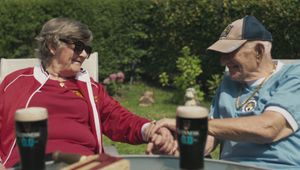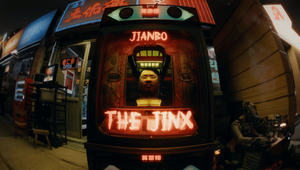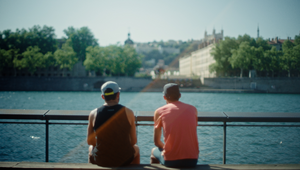
The Story Behind This Cinematic Viewpoint of War in Ukraine

Today marks exactly one year since the Russian invasion of Ukraine in 2022. A year of civilian death, destruction, and a global community coming together in a bid to end Russia’s terrors.
In the past year, the creative industries in Europe and beyond have shown incredible support to their brothers and sisters in Ukraine, with heaps of work that has spread the word and helped different organisations within Ukraine break the Kremlin’s wall of silence and show the war’s real face. The collective communications efforts of Ukraine and the rest of the continent have resulted in well over £400 million raised from the British public alone, according to the Disasters Emergency Committee (DEC).
Exactly a year after these efforts began, the DEC looks back on the continued support the community has offered, and dares to look ahead to brighter times. The film, ‘Never Alone’, is not at all about patting each other on the back for a job well done - quite the contrary. “It is a message of resilience from Ukraine to the UK, so that the British public feels the difference their donations have made, both physically and psychologically as well,” says Saleh Saeed, chief executive of the DEC.
Produced by Stink Films and created by Don’t Panic, with the help of Ukrainian service company Radioaktive, the film was shot totally remotely in Ukraine and features people who have chosen to stay in or return to the war-torn country. Naturally though, shooting in an active war zone is no small feat. The production process involved creating entirely new crew roles according to the situation, adaptability, and on top of that - a last minute director change.
LBB’s Zoe Antonov spoke to Stink’s Rick Dodds, creative partner of Don’t panic and co-director to Stink Films' Leo Maguire, about what it was like to shoot a war zone cinematically, the importance of location scouting, and casting characters that embody the strength of Ukraine.
LBB> You collaborated with Radioaktive, a Ukrainian service company. How did that process go and what was Radioaktive's role in making the project possible?
Rick> I sent the script to Blake at Stink and he rang me straight back and said “we have to shoot this in Ukraine!”. Once I had picked my jaw back up off the ground, I asked, “how on earth are we going to shoot this in an active war zone?” and he said he’d spoken to Darko at Radioactive and they felt we could do it! I remember nodding and thinking, “Well if Darko says we can, then I guess we can!”
The production then kicked off. Leo was the director, I was the writer, Blake and Val (from Radioactive) producers. But that’s where the normality stopped. Everything else about this production was different.
For starters, we had to hire a head of security who sat separately to the main production team. His job was simply to decide if places were safe. Safe for us to recce. Safe for us to cast in. Safe to shoot in. A level of detail that we never need to think about.
During this pre production Leo got sick and had to pull out. Blake called me and asked if I would take up the reins. I had directed before and been fortunate enough to win a couple of British Arrows for it and had often thought about doing it again. But this was a big shoot with big shoes to fill. It wouldn’t have been possible without the support and trust from Stink, Radioactive and my friends at Don’t Panic.
It’s impossible to overstate just how incredible Radioactive were at this point. Not only were they trying to pull off a cinematic shoot in an active war zone. They now had a change in director.
LBB> How did you choose the locations together with Radioaktive in the film and why were they the locations you went for?
Rick> Whenever we’ve seen an active conflict zone, it’s been through the lens of the news and documentarians. We wanted to capture Ukraine in 2023 cinematically. For this to be the first time any of us can remember seeing a conflict zone captured in a perfectly composed film.
So we looked for locations that said everything in a single composed shot.
The swings, perfectly situated between two burnt out buildings. A couple’s house that literally has half of it blown up. A bunker that has become normal daily life.
These locations told a story all by themselves. So we didn’t need fancy camera work or choreographed movements. We just needed confident filmmaking. Framing the shot, the location, the actor and trusting in the power of all of that to move the audience.
LBB> Tell me more about the casting process. How did you choose your cast? Was it difficult to cast people who wanted to participate and were the stories their characters told their real life stories as well?
Rick> We cast actors for this film, but they’re also human beings who are living in an active conflict zone. Which is quite unique as they had the acting ability but also the real life emotions for the film. We had an idea of the cross section of society we wanted to cast, but our brief was more about stoicism. We were looking for people, faces and characters that embodied the strength of Ukraine. And we found it everywhere. In everyone.
I think this approach to casting is why there is so much authenticity and truth in this film, because it’s neither a pure documentary or a fictional script. It sits somewhere between genres, and this was a really exciting place to explore.
LBB> The script for the film is actually the lyrics to 'You'll never walk alone' by Gerry & The Pacemakers - what informed that choice and what made it perfect for the film?
Rick> From the beginning we wanted to find a piece of music that resonated with the British public, but also had enough depth in the lyrics that a Ukrainian cast could make them their own.
There were quite a few tracks that really hit home for us, but ‘You’ll Never Walk Alone’ just had more depth than others. Almost every line resonated with a situation. From a refugee ‘walking through the storm’ to a couple sitting in front of their blown apart house saying ‘though your dreams be tossed and blown’. It also had defiance. In lines like ‘walk on’ and the kid in the bunker saying ‘with hope in your heart’ as bombs reigned overhead.
Instinctively we also didn’t want the music itself to play a part. This was about the words, and the cast owning them. Adding the original melody would have taken us back into our own world. We were very lucky that the incredible Max Richter agreed to let us use the atmospheric and powerful Infra 5 on the film. A special thanks to Sara Giles at King Lear for helping make that happen.
LBB> Tell us about the importance of the creative and communication industries engaging with the conflict, one year after its start.
Rick> Ukraine was a production hub. Which means there are so many talented creative professionals who are now also refugees. Hiring them on your next production is a great way to help through the work we all do day in day out.
We’ve all shot in Ukraine before the conflict began. I really hope that the last time fellow creatives and directors shot in Ukraine, isn’t the last time they’ll shoot in Ukraine.
LBB> And what are your biggest hopes for the project after it airs?
Rick> That the British public feel a deeper emotional connection with the people of Ukraine. The people they have stood shoulder to shoulder with through their donations.
And hopefully, the British public feel compelled to give again in the future. Because it matters. It really really does.















